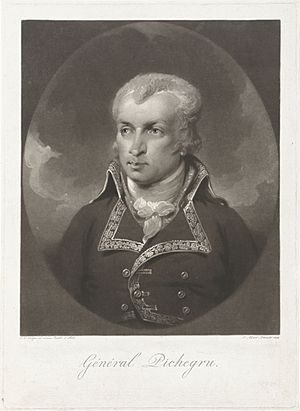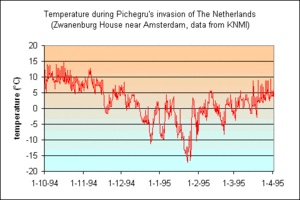Jean-Charles Pichegru facts for kids
Quick facts for kids
Jean-Charles Pichegru
|
|
|---|---|

Portrait by Charles Howard Hodges, 1795
|
|
| Born | 16 February 1761 Arbois or Les Planches-près-Arbois |
| Died | April 5, 1804 (aged 43) Paris |
| Allegiance | |
| Years of service | 1783–1797 |
| Rank | Divisional general |
| Battles/wars | French Revolutionary Wars |
Jean-Charles Pichegru (born February 16, 1761 – died April 5, 1804) was an important French general during the French Revolutionary Wars. He led French troops to victory in Belgium and the Netherlands. Later, his support for the king led to his arrest and exile to Cayenne, French Guiana, in 1797.
After escaping, he went to London. He later returned to France and planned to remove Napoleon from power. This led to his arrest and death. Despite his later actions, his name is still written on the Arc de Triomphe in Paris.
Contents
Early Life and Military Start
Pichegru was born into an ordinary family in Arbois, France. He was educated by monks and later went to the military school in Brienne-le-Château. There, he taught mathematics. One of his students was a young Napoleon Bonaparte.
In 1783, Pichegru joined the army. He quickly rose through the ranks. He even served briefly in the American Revolutionary War. When the French Revolution began in 1789, he became a leader of the Jacobin Club in Besançon. He was soon elected as a lieutenant colonel in a volunteer regiment.
Leading Armies on the Rhine
Pichegru's skills were quickly noticed in the French Revolutionary Army. He was promoted to general. In 1793, he became commander-in-chief of the Army of the Rhine.
He led his army against the Coalition forces in the Battle of Haguenau. Over several weeks, his troops pushed back the enemy. The French eventually won, forcing their opponents to retreat. Pichegru also helped win the Second Battle of Wissembourg.
Victories in the North
In 1794, Pichegru took command of the Army of the North. He fought three major campaigns that year. He defeated the Count of Clerfayt in several battles, including Cassel and Courtrai. His army also won the battle of Tourcoing in May 1794. These victories helped the French take control of the Low Countries.
Pichegru's second campaign began in October. His army crossed the Meuse river and captured Nijmegen. They pushed the Austrians back beyond the Rhine. The French army then crossed the frozen Waal river in January. They entered Utrecht and then Amsterdam. The French took control of the entire Dutch Republic that month. This was a huge victory for France.
One famous event was the Capture of the Dutch fleet at Den Helder. French soldiers on horseback captured Dutch warships stuck in the ice. The French troops showed great discipline in Amsterdam. They did not loot the city, which was very rich.
Later Life and Downfall
After his military successes, Pichegru became involved in politics. He was elected to the Council of Five Hundred. However, he secretly began working with Royalists. He planned to bring back Louis XVIII as king.
His plans were suspected. He resigned from the army in October 1795. In 1797, Pichegru was arrested during a political event called the Coup of 18 Fructidor. He was sent to Cayenne, French Guiana.
Escape and Death
Pichegru managed to escape from exile with seven others. He fled to London, where he joined other French people who had left France.
In 1803, Pichegru returned to Paris with Georges Cadoudal. They planned a royalist uprising against Napoleon Bonaparte, who was then the leader of France. However, Pichegru was betrayed by a friend. He was arrested on February 28, 1804.
Pichegru was later found dead in prison on April 6. Many people blamed Napoleon for his death. However, there is little proof that Napoleon was involved. His supporters argued that Napoleon had nothing to gain from Pichegru's death. Pichegru was buried in a cemetery in Paris.
Images for kids
-
Portrait by Charles Howard Hodges, 1795
See also
 In Spanish: Jean-Charles Pichegru para niños
In Spanish: Jean-Charles Pichegru para niños
 | William M. Jackson |
 | Juan E. Gilbert |
 | Neil deGrasse Tyson |




